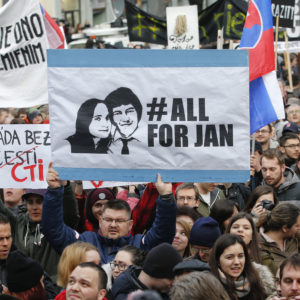BRUSSELS — No reply when a relative called a well-known journalist last month.
No reply, no reply, and finally, an anxious home visit revealed the reason — one that has shocked the Europe.
Jan Kuciak was found dead with a single shot to the chest; his fiancee, Martina Kusnirova, was nearby with a fatal bullet head wound. They would have married in May.
Because of his fame, some would say notoriety, as an investigative website reporter, the Slovak authorities began joining up the dots with unusual speed.
In recent months Kuciak had had a series of scoops in which he linked leading Slovak government figures with suspected Mafia members. Bit by bit he was exposing murky deals involving realty, money laundering and tax fraud.
Being a brash, ambitious 27-year-old close to another story that would embarrass ministers, Kuciak could have underestimated the government’s hostility toward the media in this small central European state (population: 5.5 million).
But he must have known a colleague investigative reporter disappeared completely in 2008 and another only three years ago — mysteries that have never been solved.
He would certainly have been aware of the lawsuits directed at the media in recent years by the government and financial interests averse to outsiders’ curiosity. Kuciak was probing links between the government and the Naples, Italy-based branch of the Mafia when he was gunned down in his own living room.
Slovakia joined the 28-member European Union only 14 years ago, a move that boosted the peasant economy to a recognizably modern, consumerist one. But, as with other EU nations released from Marxist ideology, new wealth brought “oligarchization” — a rush of unscrupulous opportunists who grabbed plum jobs in finance and politics. Kuciak and colleagues disliked the rough-house ethics of their post-Communist times.
Investigative journalism began to flourish in a country which ranks 17th in the World Press Freedom Index even though a successful defamation suit could be punished by a prison sentence.
But a double murder in suburban Bratislava, the capital, sitting on a broad sweep of the Danube, brought a gruesomely different perspective to Slovak affairs.
And the world woke up.
In no time the European Parliament slammed the Slovaks. “This is an unacceptable attack on press freedom, a founding value of our democracies, just a few months after the murder of Daphne Caruana Galizia,” said EP President Antonio Tajani, referring to the car bomb murder of a Maltese investigative journalist last November.
The whole Parliament stood in silent tribute to the latest victims. Media outlets across the continent condemned the outrage, many recalling a previous occasion when the now former Prime Minister Robert Fico had publicly described reporters as “filthy anti-Slovak prostitutes” — which was going it some even for this leftover relic from Communism. He never apologized for foul-mouthing the press.
Now Fico has gone. Or has he? A veteran reporter friend, Tibor Makak, thinks not really. “These are only cosmetic changes,” he says in the wake of recent protests in Slovakia that brought 120,000 people onto the streets across the nation, the largest demonstration since Communism imploded in 1989.
“(Peter) Pellegrini (Fico’s successor) is only a puppet covering Fico’s hand. We can do nothing if the government still has a majority in Parliament — which it does,” Makak said.
There is little prospect an election will be held soon. “It would be a chaotic exercise,” Fico said as he was nominally pushed aside.
Nor, it seems, will relations between government and the press improve after this “heinous crime,” or as Makak describes it, this “cold-blooded murder.” On both sides the institutional memory of the killings and their political fallout will be poisonously strong for years.
In the EU headquarters in Brussels, especially in the European Parliament, there are other horrors to the east. Turkey is not an EU member but authorities there are holding 150 journalists in prison, five of whom have just been given life sentences for allegedly “attempting to abolish the Turkish constitution.”
In Slovakia the search for the killer(s) continues and a reward of more than $1 million remains on offer.

